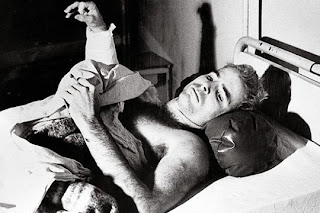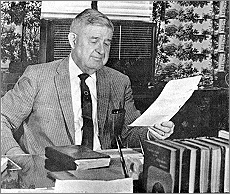Here is an awesome commercial running from Vets for Freedom asking a legitimate question of Barack Obama: "Why won't you come visit the troops in Iraq?"
She is an Iraq Veteran who asks "why won't you meet with General Petraeus, but would meet with terrorists?" This is HUGE!!
Thursday, May 29, 2008
Kate Norley and Vets for Freedom Video on Barack Obama and Iraq
Posted by
Bill's Waste of Air
at
7:09 AM
2
comments
![]()
Labels: Barack Obama, General Petraeus, Iraq, Kate Norley, Veterans, Vets for Freedom
How we can ALL be Equal, Truly Equal
Posted by
Bill's Waste of Air
at
7:02 AM
4
comments
![]()
Labels: Barack Obama, Burkha, Equality, Freedom, Hillary Clinton, Islam, Muhammed, Taliban
Barack Obama goof ups or Obamaism's
Let's take a look at the latest "Obamaism's"!
1 - "I have been in oh, 57 states so far and have a few more to go".
2 - "As Commander OF Chief......."
3 - "My uncle freed prisoners from Auschwitz or Buchenwald err one of those places".
4 - (At a Memorial Day speech) "We are here to honor those who have fallen in wars for this country and some of them I see standing here today".
5 - (To a news reporter, female) "Hey Sweetie, can you hang on a minute".
Yes this is the man who would be President. And the libs thought George W. Bush was dingy!
Posted by
Bill's Waste of Air
at
6:47 AM
3
comments
![]()
Labels: Barack Obama, Commander of Chief, gaffes, President George W. Bush, Stupid
Movie Review: Indiana Jones and the Kingdom of the Crystal Skull
Posted by
Bill's Waste of Air
at
6:36 AM
1 comments
![]()
Labels: Cate Blanchett, George Lucas, Harrison Ford, Independence Cinema, Indiana Jones, Sean Connery, Steven Spielberg
Tuesday, May 20, 2008
The Godless State of Oregon, or How Barack Obama Won
Posted: 11:14 PM ET
From CNN Senior Political Analyst Bill Schneider
Posted by
Bill's Waste of Air
at
8:34 PM
9
comments
![]()
Labels: Barack Obama, Church goers, CNN, Democrats, Hillary Clinton, Oregon
Monday, May 19, 2008
John McCain, War Hero Revisited. This is a MAN!
 Here is Senator John McCain while a POW in Vietnam. He went through pure Hell when he was captured.
Here is Senator John McCain while a POW in Vietnam. He went through pure Hell when he was captured.
John McCain spent 5½ years in captivity as a POW in North Vietnam. His first-person account of that harrowing ordeal was published in U.S. News and World Report in May 1973. Shot down in his Skyhawk dive bomber on Oct. 26, 1967, Navy flier McCain was taken prisoner with fractures in his right leg and both arms. He received minimal care and was kept in wretched conditions that he describes vividly in the U.S. News special report:
Posted by
Bill's Waste of Air
at
7:18 AM
4
comments
![]()
Labels: John McCain, POW, President, Suffering, US News and World Report, Vietnam
George W. Bush Still Has It! Israel Speech!
This is the thought coming out of Israel on President Bush's speech last week that the liberals and Barack Obama in particular have blasted.
I have never been more proud of him as President.
This is a very special speech and this review from the Jerusalem Post is well worth reading!
Analysis: If only Israel's leaders would speak as Bush did
Herb Keinon , THE JERUSALEM POST
May. 15, 2008
The cynics among us will say that words don't mean much, that talk is cheap, and that the lofty rhetoric US President George W. Bush employed on our behalf in the Knesset Thursday will be forgotten tomorrow.
But the cynics will be wrong.
Sometimes, when you're knee-deep in the day-to-day, when you're just struggling to get by, when you're facing forces that seem so much bigger than you, there is a need for someone from the outside - someone bigger and more powerful - to come by, pat you on the back, tell you that you are not alone, and remind you both of your inherent worth and that it is all inherently worth it.
That is what the Bush did Thursday in the Knesset.
Centuries of suffering and sacrifice were to pass before the dream of a Jewish state was fulfilled, Bush reminded us. "The Jewish people endured the agony of the pogroms, the tragedy of the Great War, and the horror of the Holocaust - what Elie Wiesel called 'the kingdom of the night.' Soulless men took away lives and broke apart families. Yet they could not take away the spirit of the Jewish people, and they could not break the promise of God."
Were that Israel's own leaders would speak in similar terms; were that Israel would believe as much in itself.
"Yet in spite of the violence, in defiance of the threats, Israel has built a thriving democracy in the heart of the Holy Land," the US president said, reminding us of our not insignificant accomplishments. "You have welcomed immigrants from the four corners of the Earth. You have forged a free and modern society based on a love of liberty, a passion for justice, and a respect for human dignity. You have worked tirelessly for peace. And you have fought valiantly for freedom."
We know all that, and over the last few weeks our own leaders - from President Shimon Peres to Prime Minister Ehud Olmert to Chief of General Staff Lt.-Gen. Gabi Ashkenazi - have taken the opportunity of the 60th anniversary to remind us. But, oddly, it somehow sounds more honest when it comes from an outsider, more genuine from somebody who doesn't have to say it.
When, during our current bout of self-doubt and fear, was the last time an Israeli leader stood up and with a conviction that made you believe he meant it, not that he was just mouthing tired phrases, said - as Bush did Thursday - "Masada shall never fall again."
And then, even more importantly, Bush added, "Citizens of Israel: Masada shall never fall again, and America will always stand with you."
Words? Maybe. But they are important words, because if ever this country is again to take another calculated risk for peace, it will have to know that the US stands completely behind it.
Words? Maybe. But if ever the Arab world will ever come around to accepting Israel's existence, it will have to know that it cannot drive a wedge between Jerusalem and Washington.
The speech, at parts elegantly phrased, also echoed sentiments many of us feel, but rarely hear aired outside the shtetl.
Bush said not to be swayed by popularity polls or the capricious opinion of "international elites."
He said that we deserve a normal life just like everyone else in the world; that the UN has treated us shabbily; that those who openly ask whether Israel has a right to exist are anti-Semites, and that those who excuse this sentiment are little better.
He said we have the right to protect ourselves and - of course - that we don't have to negotiate with those who want to destroy us. He took on, without mentioning them by name, the Jimmy Carters and Walts and Mearscheimers of the world who say that if the US would just break with Israel, all its Middle East problems would vanish.
"This is a tired argument that buys into the propaganda of our enemies, and America rejects it utterly," Bush said, setting up what at first sounded somewhat corny, but on second blush was the most back-stiffening line of the speech. "Israel's population may be just over seven million. But when you confront terror and evil, you are 307 million strong, because America stands with you."
By referring to an unnamed senator silly enough in 1939 to have thought he could have talked Hitler out of invading Poland and starting World War II, Bush also flicked a stinging jab at Democratic presidential hopeful Barrack Obama, who wants to talk to Iran's President Mahmoud Ahmadinejad. "We have an obligation to call this what it is: the false comfort of appeasement, which has been repeatedly discredited by history," Bush said.
Many of us know all that intuitively, and indeed talk about it weekly around the Shabbat table. But it's one thing for us to say it, and another for it to be uttered by the world's most powerful individual, especially when he didn't have to say it.
Remember, Bush didn't have to utter these thoughts: his political career is over, he no longer needs the Jewish vote or campaign support - further proof he actually meant what he said.
Posted by
Bill's Waste of Air
at
6:54 AM
4
comments
![]()
Labels: Barack Obama, Israel, Jerusalem Post, Knesset, Liberals, President George W. Bush
Saturday, May 17, 2008
The Chronicles of Narnia: Prince Caspian Review
Posted by
Bill's Waste of Air
at
9:43 PM
3
comments
![]()
Labels: C.S. Lewis, Chronicles of Narnia, Hollywood, Prince Caspian
Thursday, May 15, 2008
Keith Olbermann to President Bush: "Shut the Hell Up!"
Yep, that was what he said. Not only that, but he accuses our troops of being "cold blooded killers!".
Much like the famous rant of a mad man on the classic film "Network" played by Peter Finch: "I'm mad as hell and can't take it anymore", Olbermann went off the deep end.
You can disagree with the President but to call him "boneheaded" and other such derogatory terms, is just plain wrong, free speech or not.
I have already emailed MSNBC and encourage you to do the same. Email: letters@msnbc.com
You really need to watch this video, be patient, it is 12 minutes long and it may hang up at times, but it is well worth it. You must hear what he says! After viewing, tell me why this man should be allowed to be on the air?
He is a sick, sick man. How did he go from Sportscenter on ESPN to this?
This was his commentary on MSNBC last night:
Posted by
Bill's Waste of Air
at
6:44 AM
8
comments
![]()
Labels: "Network", Iraq, Keith Olbermann, MSNBC, President George W. Bush, rant, troops
Tuesday, May 13, 2008
"The Chickens Come Home to Roost" Sermon?
By Dr. John R. Rice (1895–1980)
We are told in the Bible, “It pleased God by the foolishness of preaching to save them that believe” (I Cor. 1:21). So God cannot get along without preaching, if He is to get men saved. All the Sunday school organization, all the educational and social work the church can do cannot substitute for God’s plan. “It pleased God by the foolishness of preaching to save them that believe.”
Preaching, then, is of surpassing importance in God’s plan of saving men. Nothing can take the place of preaching. Hence, we need a revival of great preaching. Christianity flourishes when preaching flourishes. When men stand in pulpits and give book reviews or moral essays instead of preaching in the Bible sense, then Christianity languishes. When men, timid men, give little sermonettes instead of bold and powerful and commanding discourses, Christianity is on the wane.
Since preaching is of such momentous importance in God’s plan, it is worthwhile to study earnestly what kind of preaching we need. And we can find the kind of preaching we need by turning to the Bible and considering the precepts and the examples given by the Word of God for preaching. What does the Bible say men ought to preach? And how did the Bible preachers preach? The answer to these questions is sorely needed today.
And what is the Gospel? In I Corinthians 15:1–4 Paul tells us the Gospel he preached and by which his converts were saved: “Moreover, brethren, I declare unto you the gospel which I preached unto you, which also ye have received, and wherein ye stand; By which also ye are saved, if ye keep in memory what I preached unto you, unless ye have believed in vain. For I delivered unto you first of all that which I also received, how that Christ died for our sins according to the scriptures; And that he was buried, and that he rose again the third day according to the scriptures.”
Christ died for our sins according to the Scriptures and was buried and rose again the third day according to the Scriptures. That is the Gospel. That is the Gospel Paul received, the Gospel he preached, the Gospel by which his converts were saved. It is the same Gospel that every preacher everywhere should preach today. No preaching is Christian preaching that does not preach salvation by the atoning death of Christ.
A horrible curse is pronounced on any who preach any other gospel than that of salvation by the blood of Christ. In Galatians 1:6–9 is this apostolic declaration in the inspired Word of God: “I marvel that ye are so soon removed from him that called you into the grace of Christ unto another gospel: Which is not another; but there be some that trouble you, and would pervert the gospel of Christ. But though we, or an angel from heaven, preach any other gospel unto you than that which we have preached unto you, let him be accursed. As we said before, so say I now again, If any man preach any other gospel unto you than that ye have received, let him be accursed.”
Even if an angel from Heaven should preach any other gospel, “let him be accursed”! Even if Paul the apostle himself should come and preach another gospel, “let him be accursed”! And again the curse is pronounced: “As we said before, so say I now again, If any man preach any other gospel unto you than that ye have received, let him be accursed.”
Any man who preaches salvation by character is a condemned, lost sinner with the curse of Almighty God upon him! Any man who preaches a so-called “social gospel,” which is no gospel at all, “let him be accursed,” let him be damned. He is a doomed, Christ-rejecting sinner. He is not even a Christian, and he has no right to preach. He is a blind leader of the blind. He is a wolf in sheep’s clothing, Jesus Christ Himself being witness. To men like him, Jesus said, “Ye serpents, ye generation of vipers, how can ye escape the damnation of hell?” (Matt. 23:33).
In II John, verses 9 to 11, is another plain command of God about those who do not bring the true Gospel, or the true doctrine of salvation by Christ: “Whosoever transgresseth, and abideth not in the doctrine of Christ, hath not God. He that abideth in the doctrine of Christ, he hath both the Father and the Son. If there come any unto you, and bring not this doctrine, receive him not into your house, neither bid him God speed: For he that biddeth him God speed is partaker of his evil deeds.”
Again we are told that anybody who does not stand true to this doctrine that Christ Himself, God’s Son, is come in the flesh to save people, that He died and rose again—anyone who does not receive that doctrine—does not have God. He is not a Christian. He is a Hell-bound, wicked sinner. The curse of God is upon him. No Christian should ever go to hear any such man preach. No Christian should ever give a penny to his support. Such a man should not even be entertained in your home. You should never bid him Godspeed. To support him, to lend your encouragement, to give him fellowship is to be a partaker of his wicked deeds in damning souls by denying the true Gospel.
No Christian should ever support or encourage or receive into his home a modernistic preacher, one who does not believe the Bible and who has not trusted in the Christ of the Bible, the virgin-born Son of God who died for our sins and rose bodily from the grave and ascended to Heaven and is coming again. One who does not believe this Gospel is not a Christian and is not fit to preach.
In every church in the land where there are sincere Christians, they should immediately oust any preacher who does not preach the Gospel of salvation by the blood. If they cannot oust the preacher, they should themselves leave and never give another penny to the support of such a church and such a modernist, unbelieving infidel.
The first essential thing about preaching is that it is to be Gospel preaching, true to the blood, true to the Bible teaching of salvation by faith in Christ, who died an atoning death and rose from the grave to be our Saviour. Oh, beloved preachers, preach Christ and His blood and His salvation freely offered to dying sinners!
II. We Need Preaching of the Word of God, the Bible
We need Bible preaching! A slanderous and unscriptural book against evangelism by a seminary president says that evangelists ought to preach nothing but the simple Gospel of how to be saved. But when Paul wrote to Timothy telling him to “do the work of an evangelist,” he gave him a solemn charge to preach all the Word of God.
“I charge thee therefore before God, and the Lord Jesus Christ, who shall judge the quick and the dead at his appearing and his kingdom; Preach the word; be instant in season, out of season; reprove, rebuke, exhort with all longsuffering and doctrine.”—II Tim. 4:1,2.
That is in the same passage where Paul commands Timothy to “do the work of an evangelist.” The evangelist as well as the pastor is to “preach the word.” The foreign missionary is to “preach the word.”
You see that the Gospel of salvation is not all of the Bible. The Bible has other things besides the plan of salvation. The Ten Commandments are not in the plan of salvation. The Sermon on the Mount is beautiful and good, and it ought to be preached, but it is not the plan of salvation by the blood of Christ. First Corinthians 13, the love chapter, teaching brotherly charity, is in the Bible, but it is not the plan of salvation. A preacher should preach the whole Word of God. His preaching should be Bible preaching.
Bible preaching would necessarily be preaching against sin. Paul commanded Timothy, “Preach the word…reprove, rebuke, exhort with all longsuffering and doctrine.” There has to be scriptural rebuke and reproof for sin if it be true Bible preaching, preaching like that of the great men of God in the Bible.
When Nathan the prophet came before David, he gave a thrilling example of a God-called and God-anointed preacher preaching against sin. Before him was King David in his robes, with the power of life and death over every subject. Yet Nathan boldly preached him a sermon, using a parable to show the wickedness of David’s sin. Then when the anger of David was aroused against the hypothetical rich man who had taken his neighbor’s little ewe lamb, Nathan with crushing and powerful effect pointed his finger in the face of King David and said, “Thou art the man”
(II Sam. 12:7), and showed him the horrible sin which he had committed in taking Bathsheba, the wife of Uriah, and murdering Uriah. It was a tense moment. Nathan might have lost his life. But he stood up for God and openly denounced sin. God give us more Nathans today in the pulpit, as well as in private conversations!
“Murderers”! “Betrayers”! ‘Persecutors!’ “Stiffnecked and uncircumcised in heart and ears”! “Ye do always resist the Holy Ghost”! That is Bible preaching against sin!
It is true that it brought the wrath of the crowd upon Stephen. It is true that he was beaten into a bloody mass, stoned to death in their anger. But he went home to Heaven that day, and Jesus, who usually sits on the right hand of the Father, rose to receive him! (Rev. 3:21; Acts 7:56).
Oh, to go to Heaven like Stephen did! Oh, to go with lips purified by bold preaching in Christ’s name, preaching against sin, preaching in the power of the Holy Ghost!
How Jesus preached against sin! He preached against covetousness; He preached against unbelief; He preached against adultery or even looking on a woman to lust after her. He preached against grudges and said that if men did not forgive, neither would the Father in Heaven forgive them. He said to the Pharisees and scribes, “Ye are of your father the devil, and the lusts of your father ye will do.” He told the religious leaders who were impenitent that they had been granted the use of God’s vineyard, the leadership over His people, but that they would be cast out and the vineyard rented to others. Men hated Jesus because He preached against sin. God forgive us preachers who never anger anybody by preaching like Jesus!
Some preachers preach on love but never preach against sin. The Lord Jesus loved men, loved sinners enough to die for them, but how He hated sin! Remember when He made a whip, drove the traders from the temple, overturned the tables of the moneychangers, scattered the money on the stone floor! Preaching ought sometimes to be like that. With holy boldness preachers ought to hate sin and expose sin.
Young preacher, do not be taken in by the sophistry of the time-serving preachers who do not preach against sin. Do not be influenced by denominational leaders who fear you will cause a disturbance in your church. Do not be too much moved by the pleadings of your wife, who is afraid that you will have your salary lowered or that you will be out of a job with no place to go. Be faithful to Christ, and Christ will be faithful to you. “Them that honour me I will honour” is the promise of God (I Sam. 2:30).
It is not honest preaching of the Bible that does not preach Hell. Man is a sinner. If he does not repent, he will die unconverted, forever away from God. Men ought to be warned of the horrible fate of dying without Christ.
I am sick of hearing people say, “I do not believe in scaring men.” I do! I wish I could have scared Hitler and told him what would happen to him for his crimes against mankind and against God. If I could have told him the truth and could have made him believe it, I would have saved the world the horrors of World War II.
I wish I could warn every boy of what will happen if he goes into a life of crime. I wish I could make people afraid of crime.
I wish I could scare every girl about the dangers of the dance and petting, and the horrors of the life of a harlot and the damnation that will come to her.
I wish I could scare every lad about the terror that is in whiskey and beer and wine. A man who is not afraid of liquor is a fool.
I tried earnestly and was successful in making my children afraid of the fire when they were little. There are some things of which any sensible person in his right mind ought to be afraid. And there is nothing in the universe as frightful as the fact of Hell, a Hell full of Christ-rejecting sinners, who went to Hell because they would not repent. I am for the kind of Bible preaching that makes people want to avoid Hell.
All Bible preachers preached on these themes of Hell and judgment and the wrath of God.
Isaiah preached on Hell. He said, “Hell from beneath is moved for thee to meet thee at thy coming” (Isa. 14:9). He preached, “Therefore hell hath enlarged herself, and opened her mouth without measure: and their glory, and their multitude, and their pomp, and he that rejoiceth, shall descend into it” (Isa. 5:14).
But Jesus was the great “Hell preacher.” He preached, “And fear not them which kill the body, but are not able to kill the soul: but rather fear him which is able to destroy both soul and body in hell” (Matt. 10:28).
It was Jesus who preached that “whosoever shall say, Thou fool, shall be in danger of hell fire” (Matt. 5:22).
It was Jesus who preached, “So shall it be at the end of the world: the angels shall come forth, and sever the wicked from among the just, And shall cast them into the furnace of fire: there shall be wailing and gnashing of teeth” (Matt. 13:49,50).
It was Jesus who preached in the same chapter, “As therefore the tares are gathered and burned in the fire; so shall it be in the end of this world. The Son of man shall send forth his angels, and they shall gather out of his kingdom all things that offend, and them which do iniquity; And shall cast them into a furnace of fire: there shall be wailing and gnashing of teeth” (Matt. 13:40–42).
Jesus announced that He Himself, the Son of Man, would one day “say also unto them on the left hand, Depart from me, ye cursed, into everlasting fire, prepared for the devil and his angels” (Matt. 25:41). And He said, “And these shall go away into everlasting punishment: but the righteous into life eternal” (vs. 46).
It was Jesus who told, in Luke 16:19–31, that horrible, terrifying story of the rich man who died and went to Hell and there lifted his eyes, tormented in flames, and begged for Lazarus to be sent to dip his finger in water to cool his parched tongue.
I say, Jesus Christ was a hellfire preacher. One who does not preach Hell and judgment is not true to Him.
It was Jesus who said that all judgment was given to the Son. Christ will sit on a throne, judging sinners, sending them away to the lake of fire.
Paul preached, like other Bible preachers, on Hell and judgment and the wrath of God. I very often preach on the first Sunday night of a revival campaign on Hell or on the last judgment. And I do it with a good precedent, for Paul, the first time he ever preached at Athens, preached, “He hath appointed a day, in the which he will judge the world in righteousness by that man whom he hath ordained; whereof he hath given assurance unto all men, in that he hath raised him from the dead” (Acts 17:31).
It is foolish to try to teach men to trust in Christ for salvation, unless we include in that teaching the plain need for a wicked heart to turn from sin. Everywhere the Bible says, “Believe on the Lord Jesus Christ, and thou shalt be saved” or its equivalent, it is understood that no one can turn TO Jesus Christ without turning FROM sin. Inevitably and necessarily, faith in Christ comes only to the penitent heart, the heart willing and anxious to do right and to please God, longing for goodness and purity. People who repent do not always do right about everything, but they want to do right. I do not mean that salvation is an extended process. I do not even mean that there are two separate steps in salvation, but it is foolish and unscriptural to teach any salvation without repentance.
Bible preachers all preached repentance.
Ezekiel called on Israel to repent: “Say unto them, As I live, saith the Lord God, I have no pleasure in the death of the wicked; but that the wicked turn from his way and live: turn ye, turn ye from your evil ways; for why will ye die, O house of Israel?” (Ezek. 33:11). Every preacher ought to preach with that imperative pleading in his voice and message today.
John the Baptist preached, “Repent ye: for the kingdom of heaven is at hand” (Matt. 3:2). And Jesus began to preach exactly the same message: “From that time Jesus began to preach, and to say, Repent: for the kingdom of heaven is at hand” (4:17).
Peter preached at Pentecost, “Repent, and be baptized every one of you in the name of Jesus Christ” (Acts 2:38).
Paul, preaching to the men of Athens, said, “And the times of this ignorance God winked at; but now commandeth all men every where to repent” (Acts 17:30).
Oh, may God give us a heart to demand that men repent toward God and trust His Son for salvation. That is the kind of preaching we need.
VI. We Need Preaching That Demands Immediate Decision for Christ
The fatalists, the hyper-Calvinists who say some men are predestined to be lost, do not want preachers to give a public invitation and to press for a decision. Dr. Lewis Sperry Chafer, in his book slandering evangelists and opposing mass evangelism, says that it is wrong to give a public invitation for people to accept Christ, wrong to press for immediate decision. But there he is unscriptural and contrary to Bible precept and practice. Down through the centuries, the great soul winners have pressed upon people to decide, and at once, for God or against Him.
When Moses, on Mount Sinai for forty days, left the children of Israel to their own devices, they asked Aaron to make them a golden calf, and then they danced around this golden calf naked and drunken and said, “These be thy gods, O Israel, which brought thee up out of the land of Egypt” (Exod. 32:4). The wrath of God burned hot against this idolatrous people. Moses, with a broken heart, set out to discipline the people. Before the leading idolaters were to be put to death, he called for a division, a public and immediate decision. “Then Moses stood in the gate of the camp, and said, Who is on the Lord’s side? let him come unto me. And all the sons of Levi gathered themselves together unto him” (Exod. 32:26). Then Moses commanded the Levites who would stand for God to take their swords and go throughout the camp, slaying the wicked. It was a hard decision for men to make, to come out on the Lord’s side publicly and set out to kill their own brothers and loved ones, but that is what Moses demanded, and that decision they made—made boldly for God. It is God’s plan. Bible preachers should call for immediate decision for Christ.
“Choose you this day whom ye will serve,” ought to be an under-current in the preaching of every Bible preacher. That means public invitation. That means putting people on the spot. That means insisting that they decide at once, here and now, for or against Jesus Christ.
Jesus pressed His disciples with the question, “Whom say ye that I am?” And how pleased He was when Simon Peter answered and said, “Thou art the Christ, the Son of the living God” (Matt. 16:15,16).
John the Baptist demanded immediate decision and pressed upon people to come out openly and be baptized, therefore confessing their sins and confessing their faith in the coming Messiah.
Paul went “night and day with tears,” urging people to repent and come to Christ. Everywhere he demanded repentance and got it.
Some years ago in Dallas, Texas, in the Galilean Baptist Church, Dr. P. B. Chenault was preaching in a series of meetings. The last night came. He preached on “Today and Tomorrow.” He had two texts. One was in Hebrews 3:7: “Wherefore (as the Holy Ghost saith, TO DAY if ye will hear his voice…).” The other text was Proverbs 27:1: “Boast not thyself of to morrow; for thou knowest not what a day may bring forth.” The fervent, godly preacher made his final appeal. He laid upon all of our hearts that TODAY was the only day that someone present might ever have; that today was the day of salvation. He urged the folly of neglecting and postponing any duty and especially of neglecting salvation, since none of us could know what a day might bring forth. The service came to a close. After an earnest session of prayer and affectionate good-byes, Brother Chenault, with his wife and baby, drove away into the night toward another engagement in Illinois.
No man knows what will be tomorrow. I think the dear Saviour must have laid upon Dr. Chenault's heart the need for preaching that sermon his last night on earth.
We need preaching that demands immediate attention and immediate decision on the great issues of life and death, salvation or damnation, Christ or Satan, Heaven or Hell.
Let us pray that God will raise up anointed preachers; bold, Bible preachers and personal soul winners:
Who will preach the true Gospel of salvation by the blood;
Who will preach the Word of God, the Bible;
Who will preach against sin, against particular sins, preaching boldly;
Who will preach on Hell and judgment as did Christ and Bible preachers;
Who will preach demanding repentance, a heart-turning away from sin and turning toward God;
Who will preach demanding immediate decision for Christ.
Posted by
Bill's Waste of Air
at
7:37 AM
6
comments
![]()
Labels: Baptists, Evangelicals, God, Holy Spirit, John R. Rice, Pastors, Preaching, Salvation, The Church





